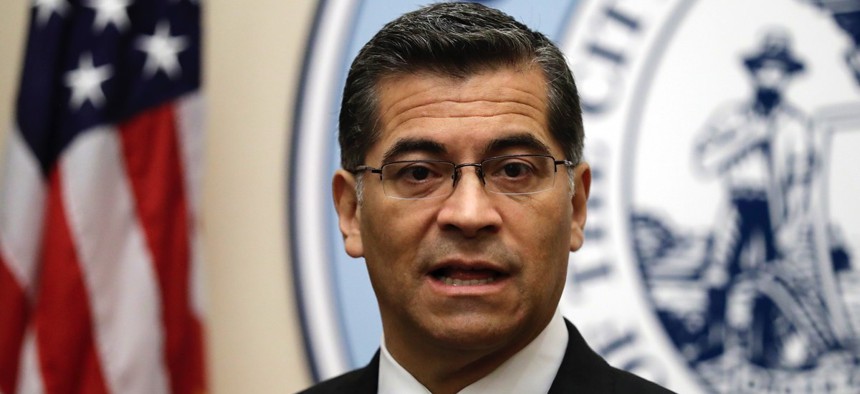Many State AGs Know That Consumer Protections Aren't Safe Under Trump

California Attorney General Xavier Becerra Marcio Jose Sanchez / AP Photo
Reforms could save billions of dollars from predatory lenders at the state level, but it’s not long before presidential appointees to federal regulatory agencies likely look to preempt them.
WASHINGTON — The watchdog role of state-level justice departments is more critical than ever, given the Trump administration’s emphasis on deregulating potentially harmful business practices, according to consumer protection experts gathered Monday in the nation’s capital.
Speaking at an event hosted by left-leaning Center for American Progress, California Attorney General Xavier Becerra’s special assistant, Eleanor Blume, said his office has prioritized providing loan protections to students targeted by predatory lenders and for-profit colleges, fighting corporate fraud, enforcing antitrust laws to encourage competition, and securing low-income and working families from massive data breaches.
Earlier this month, the California Department of Justice scuttled San Antonio, Texas-based Valero Energy’s attempt to purchase a Bay Area oil terminal and shore up a Northern California gas monopoly with a legal challenge.
“We’re seeing in this Trump era that students and low-income families, the elderly and other vulnerable populations are really lacking a voice at the federal level,” Blume said. “And so our work in California at the state Department of Justice is to fight back and to advance protections for those groups.”
Just what those protections are depends on the business practices in question.
One agreed-upon weapon in state arsenals to discourage predatory lending is a simple interest rate cap at or around 36 percent for payday loans on things like car titles. Currently, 15 states and D.C. have such caps covering 9 million people and saving them $2.2 billion annually that would otherwise go to payday lenders
After six years without movement from any state, 76 percent of South Dakota voters, who went overwhelmingly for President Trump, approved a 36 percent cap last election for an estimated $84 million in annual savings.
“Not only is it the most effective symbol and durable policy, it also is incredibly powerful politically in the face that the political left has lost and needs to somehow focus on winning again,” said Chris Peterson, University of Utah College of Law professor.
Since 2009, six states passed laws cracking down on abusive debt collection, where third-party companies acquire and attempt to collect on old debt with little documentation proving they’re pressing the right person for the right amount. Colorado and Maine enacted legislation requiring debt buyers to prove that information this legislative session, saving consumers an estimated $25 million in the Centennial State alone.
Reforms like these could save billions of dollars across states and inform future federal reform much the same way the Dodd-Frank Wall Street Reform and Consumer Protection Act codified state mortgage lending best practices as the national standard.
“States are and have been the battleground on consumer protection,” said Diane Standaert, the Center for Responsible Lending’s director of state policy.
“These issues are compounding the same group of people over and over again, and so it increases the importance of essentially ‘clearing the deck’ of these predatory practices so that low-income consumers and communities of color can build a solid foundation and have a pathway toward building assets and building wealth,” she added.
As the balance of regulatory agencies flips toward Trump appointees, Dodd-Frank is likely to see more challenges from the administration. States, as “huge holders of securities and debt through their pension funds,” should expect to have to sue federal agencies acting illegally down the road, said Brian Marshall, policy counsel at Americans for Financial Reform.
AFP is currently concerned with federal preemption of state interest rate laws, as there is bipartisan legislation being entertained by Congress, the Protecting Consumers’ Access to Credit Act, that would increase the number of companies that could ignore such caps when buying bank loans.
“That is one federal issue that would have an enormous, deleterious effect on the capacity of states to protect their consumers, especially low-income consumers who are targeted by predatory lenders,” Marshall said.
A second area of worry is the U.S. Office of the Comptroller of the Currency possibly chartering nondepository institutions as national banks under federal law, companies like tech giant Amazon, so that they could circumvent state banking laws. State suits would be required to block the maneuver.
Eighteen AGs already sued the U.S. Department of Education and Secretary Betsy DeVos over the move to freeze federal loan debt forgiveness for students cheated by fraudulent colleges, calling it a violation of the Administrative Procedure Act. The bulk of for-profit college students’ loans are federal, a “lifeline” Becerra wants to see cut off, Blume said.
California law grants the state oversight of student loan servicers, and Connecticut has a Student Loan Bill of Rights that ensures its rules also apply to banks. Maryland and Massachusetts, meanwhile, have protections that ensure for-profit colleges can’t continue to enroll students in failed programs.
Peterson suggested that public college rankings account for the amount of debt their students take on when evaluating them, allowing for “comparative, qualitative judgements” that encourage schools to keep debt loads down. Scorecards could be undertaken by state governments singularly or collectively, if not the federal government.
State AGs and banking regulators must bring public enforcement actions to ensure accountability, Peterson said, particularly AGs, who often receive campaign contributions from lenders hoping to curry favor.
“We have to pick our cases carefully,” Blume said. “And we have to pick our fights carefully and identify the opportunities where we see a way to move the law forward and right a wrong and get recovery for people in our state.”
Dave Nyczepir is a News Editor at Government Executive’s Route Fifty and is based in Washington, D.C.
NEXT STORY: Local Governments Prepare for a Federal Fight Over ‘Double Taxation’






